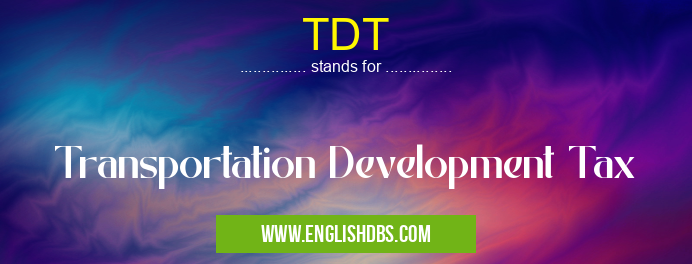What does TDT mean in TAX
Transportation Development Tax (TDT) is a tax levied on businesses and organizations that operate within jurisdictions, such as cities or states, to fund the construction, expansion and maintenance of transportation infrastructure. The rate of TDT is based on several factors, including the size of the organization and the type of infrastructure it uses. The revenue generated from TDT goes towards roads, bridges, railways, airports and other public transportation facilities. These developments are essential for any business or community to remain competitive in an ever-growing globalized environment.

TDT meaning in Tax in Business
TDT mostly used in an acronym Tax in Category Business that means Transportation Development Tax
Shorthand: TDT,
Full Form: Transportation Development Tax
For more information of "Transportation Development Tax", see the section below.
What Does TDT Stand for?
TDT stands for Transportation Development Tax. It is a form of taxation applied to businesses and organizations that exist within certain jurisdictions in order to fund the building, expanding and maintaining of any kind of transportation infrastructure such as roads, highways, airports or railway systems.
What Is TDT Used For?
TDT funds are used to build new infrastructure projects or maintain existing ones within a jurisdiction. This money helps pay for construction costs such as labor, materials and any other related expenses associated with building and improving public transportation networks at large scales. It also pays for smaller-scale projects such as sidewalk repaving or bridge repairs. This money is usually collected through taxes levied by local governments from businesses operating within their borders.
How Is TDT Calculated?
The amount of TDT that a business must pay is dependent on various factors including its size and type of transportation infrastructure it uses regularly; larger companies often have higher rates due to their larger scale operations which often require more funds in order for improvements to take place throughout the area they operate in. Local governments use different formulas when calculating how much each company should pay in terms of Transportation Development Tax.
Essential Questions and Answers on Transportation Development Tax in "BUSINESS»TAX"
What is a Transportation Development Tax?
A Transportation Development Tax (TDT) is a type of taxation used to fund the construction, maintenance and operation of public transportation systems throughout the United States. It is typically levied on local sales, use and excise taxes and can be used as dedicated funding for specific projects or to finance general system operations.
Where do TDT funds come from?
TDT funds are generated by local governments through taxes collected within their jurisdictions. These funds may include income from domestic fees or user charges such as fares, tolls, and parking revenues. TDT can also be generated from state and federal grants.
How much money does TDT generate?
The amount of money generated from TDT varies widely by municipality, based on the level of investment in public transit infrastructure. According to the American Public Transportation Association, in 2019, $8.4 billion was collected in Transit Development Taxes nationwide.
Who pays for TDT?
The people who are most directly affected by TDT are those who purchase goods subject to local taxes (such as sales taxes) that are included in the calculation of a municipality’s TDT rate. However, because public transportation services benefit everyone in a community, even indirect users of these services will help fund them through general tax revenue used to supplement TDT collections.
What types of public transportation infrastructure does TDT fund?
Funds collected through a Transportation Development Tax can go towards improving existing transportation infrastructure or building new systems such as light rail lines, bus routes and bike lanes. In some instances it may be used to finance improvements on existing highways or bridges.
How is TDT different than other taxes?
Unlike many other forms of taxation – which often have no particular purpose they must serve – proceeds from a Transportation Development Tax must be spent exclusively on transportation-related activities within the jurisdiction where they were collected. As such, they are considered “dedicated” funding sources and are usually earmarked for specific projects or initiatives related to public transportation.
Are there any restrictions on how TDTs can be spent?
Yes; all expenditures related to this type of tax must adhere to certain regulations that dictate how it can be allocated and how it must be documented in order to verify its compliance with applicable laws and regulations regarding its use.
Final Words:
Transportation Development Tax (TDT) is an important source of funding used to construct, expand or maintain vital public transportation infrastructure projects in jurisdictions around the world. Companies operating within these boundaries must pay TT for every dollar earned as part of their contribution to these beneficial developments - larger companies typically pay higher rates due to their greater usage rates and need for more complicated infrastructural advancements. With proper management by local governments this money is sure to continue providing necessary resources needed for future generations while encouraging economic growth throughout communities everywhere!
